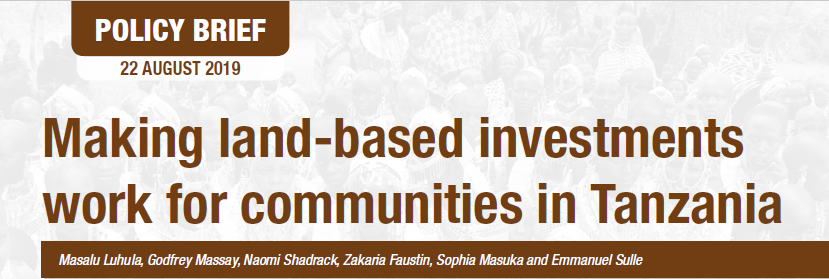EXPERTS AGREE - STRENGTHENED LAND USE PLANNING IS ESSENTIAL FOR DRYLAND MANAGEMENT

Participatory land use planning in Tanzanian drylands is an essential process in ensuring effective, sustainable and fair use of communal lands. And experts are agreeing that collecting best practices, enhancing information exchange and learning from the ground are focal strategies that will improve and strengthen natural resource use in Tanzanian drylands.
Over the last two days at a workshop in Arusha, officials from the Ministries of Land, fisheries and Livestock Development and the National Land Use Planning Commission joined with civil society organizations, land use planning experts and community representatives to discuss land use planning. The workshop focused on strategies that will strengthen lesson learning and policy dialogue to support the development of appropriate policy recommendations and guidelines for improved land use planning and rangeland management both at local and national levels.
“Pastoralists are dryland experts and expert planners,” says GeofreyMwanjela, Head of Programs at the Tanzania Natural Resource Forum (TNRF). “However, weak land tenure and land management systems coupled with competing land use demands,environmental and social pressures have created constrained planning processes in Tanzanian drylands.”
At the workshop, innovative practices and lessons from the ground were shared, including planning approaches that focus on planning across landscapes and ecosystems instead of planning based just on village or district boundaries. Many of the approaches shared were new to workshop participants and were welcomed as exciting initiatives that support effective land use in Tanzanian drylands. Most importantly, is the focus on community involvement and local knowledge in planning processes, as these should serve as the core to effective, sustainable and well supported land use plans.
“Sharing lessons and getting information out about best practices is certainly an important part of this workshop,” explains Carol Sorensen, Technical Advisor of TNRF. “But it’s also important that a commitment is made to carry on these discussions and learning, and to ensure that such knowledge is transferred into practice and implementation.”
The workshop is part of a project being implemented by five key partners, including TNRF, International Fund for Agricultural Development (IFAD), International Land Coalition, CARE and the Ministry of Livestock Development Fisheries. The goal of the project is to identify best practices and tools that can better inform participatory land use planning processes in Tanzanian drylands and rangelands, so as to secure pastoralist land and resources that are sustainably managed and used. Specifically, the project aims to develop guidelines that can be included as a supplement or addendum to the existing land use planning guidelines and policies in Tanzania

